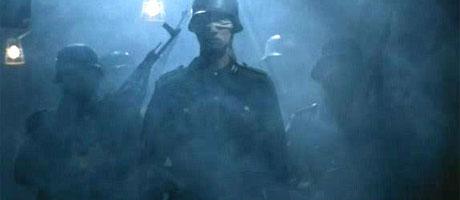
The Bunker (Movie Review)
In 1944, a group of Wehrmacht foot soldiers are falling back from the western front and being doggedly pursued by American troops. In a hail of unyielding fire and carrying one of their wounded the group of seven soldiers finds shelter in a remote bunker in the Austrian woodlands. The bunker is manned by only two soldiers. Peach-fuzzed Private Neumann and his enlisted comrade Private Mirus, an aging WWI veteran, are manning the lone gun and running low on ammunition.
The seven soldiers are derisive toward the two privates and convinced that their mere presence signals the end for the Third Reich. Everyone believes that the bunker is surrounded and they make plans to defend the fortification against an onslaught. Neumann and Mirus reveal that there is a network of tunnels beneath the bunker that may be used as an escape route should things deteriorate. Mirus is reticent about the tunnels because he believes that spirits of the dead materialize there and some of them aren’t so sympathetic to human beings. This is because the site was a burial ground for plague victims during the Black Death and many of them were buried alive during the witch hunt hysteria of the time.
Eventually, the men are forced down into the labyrinth and each is confronted by their demons. The soldiers unravel, turn on one another and the spirits of the dead avenge themselves in violent fashion. Some soldiers survive but most will have their final reckoning in the bunker.
World War II was the most widespread and costly armed conflict that the world has ever known. As such, even today it is an endlessly fertile setting for ghost stories and horrific tales of all kinds. The Nazis and the Japanese committed atrocities that were so far reaching and savage the total scope of those crimes is still just an educated guess even among scholars. And as much as the war has been fictionalized and documented by filmmakers over the years precious few films have tried to put the viewer on the German side of the fence for an entire storyline. “The Bunker” attempts to give the viewer that perspective utilizing the machinery of the ghost story
The set-up here is promising. Unfortunately, the execution is pretty standard and fraught with clichés and minor annoyances that could’ve only been absorbed by a far more dynamic story. As it stands we have a ‘ship of fools’ scenario where the guilty are punished and the innocent and contrite survive. The problems that arise from this unimaginative structure include connect-the-dots character arcs and limited plot opportunities which lead to final reveals that are vague and impact poor. The lack of impact sandbags the entire platform of the film and leaves the viewer pondering how great the sins of the soldiers actually are by contrast to what we all know about the events of WWII. Clarity could have given us, the audience a proper poke in the guts for which we could laud the film. As it stands, pertinent story facts are left in murk of punchless, super saturated flashbacks which serve to confuse the payoff and inspire one to question the motivation of the filmmakers.
Director Rob Green was the writer of “House” (2008) a laborious Christian morality tale unconvincingly decorated like a horror film. I don’t know how much of it was Green’s own conviction and how much was a paycheck but the film was an insult to the genre and made me want to dress as the devil and picket the theater ala Chris Pontius in the classic “Keep God out of California” segment on Jackass. Fortunately, I saw it on DVD.
Thankfully “The Bunker” is nowhere near the purgatorial goddessy that “House” was. That said there is still enough left unspoken to lead one to question Green’s intent. The third act has a smidge of Lazarus, a helping of repentance and a dash of forsaking graven images or rejecting idolatry. Or maybe I am still just miffed at Rob Green for “House” and I need to cut him a break here.
You can only cut so many breaks. The problems of “The Bunker” don’t end with the fact-thin story-telling and cloudy spiritual underpinnings .The acting here is actually pretty solid which is no surprise given the assembly of familiar British character actors that make up the cast. Sadly, the solid cast is tripped up by the aforementioned weak character-writing as well as their native language. That the characters are stock and evolve along highly predictable pathways is only slightly more offensive than the fact that they all speak English, exclusively. I know that this is a well-worn convention in American and British film, but I have hated it ever since I saw my first subtitled movie and I still hate it today. If your characters and action are set in a country that doesn’t speak English, find actors who speak the tongue of the land. One of the best things about today’s audience is that we will sit still for subtitles if the story is compelling enough. If you don’t think so just watch an episode or two of “Heroes”.
“The Bunker” has a horror rich set of circumstances; it is set in the most terrifying time in modern history and has a good cast. Ultimately its failure is down to the writer and director. The film is too antiseptic to be creepy; too boiler plate and meandering to be tense or intense. The lighting is paint-by-numbers, the gore factor is negligible and the denouement is without reward. Did I mention that the music stinks? Awful, goofy, cartoonish. “Deathwatch”, “The Outpost”, and “Dog Soldiers” are all much better latter day soldiers-in-peril offerings. “The Bunker” is a clunker.

